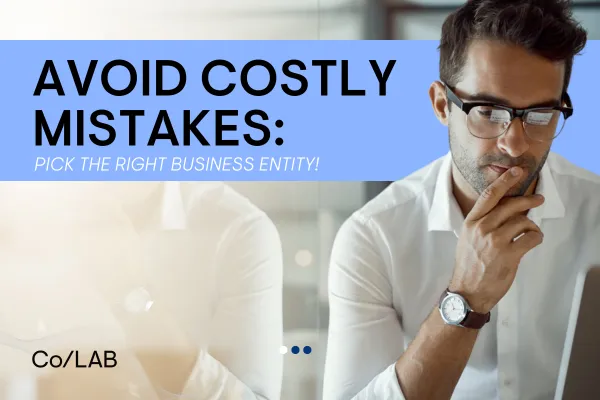BLOG
Mortgage, Real Estate, and Entrepreneurship


Starting Your Business Right: Choosing the Best Entity Structure
Starting Your Business Right: Choosing the Best Entity Structure
Starting your own business is an exciting journey filled with possibilities. However, one decision that often feels mundane but can greatly impact your financial success is choosing the right business entity structure. In this guide, we’ll dive into the various entity types, their pros and cons, and real-life lessons to help you make an informed choice.
Why Your Business Entity Structure Matters
Financial Impact of Business Structure
Your business entity determines how profits are taxed and how much you’ll pay in operational costs. Choosing poorly could lead to thousands in unnecessary expenses, as experienced by many entrepreneurs.
Legal and Tax Implications
Different structures offer varying levels of legal protection and tax advantages. For example, an LLC protects your personal assets, while a sole proprietorship does not.
Common Types of Business Entities
Sole Proprietorship
A sole proprietorship is the simplest structure. You and your business are the same entity, which means you report income on your personal tax return. However, it exposes you to unlimited personal liability.
LLC (Limited Liability Company)
An LLC provides flexibility and liability protection. It can be a single-member entity or a partnership, making it ideal for small businesses looking to grow.
S Corporation (S Corp)
An S Corp is often an LLC that has filed to be taxed differently. It offers significant tax advantages by avoiding self-employment taxes.
C Corporation (C Corp)
C Corps are suitable for businesses planning to raise capital or expand significantly. They are taxed at a flat corporate rate, separate from the owner’s income.
The Pros and Cons of Each Business Structure
Sole Proprietorship: Risks and Rewards
Pros:
Simple to set up.
Complete control over the business.
Cons:
Personal liability for debts and lawsuits.
High self-employment taxes.
LLC: Flexibility and Limitations
Pros:
Liability protection for owners.
Can be taxed as a sole proprietorship, partnership, or S Corp.
Cons:
Requires more paperwork than a sole proprietorship.
Owners cannot take a W2 salary.
S Corp: Tax Benefits and Restrictions
Pros:
Eliminates self-employment taxes.
Allows W2 salaries and dividend payments.
Cons:
Limited to 100 shareholders.
Restricts ownership by other entities.
C Corp: When to Choose a C Corporation
Pros:
Unlimited shareholders.
Suitable for raising large amounts of capital.
Cons:
High regulatory requirements.
Double taxation on income and dividends.
Lessons Learned from Personal Experience
The Costly Mistakes of Early Business Choices
Many entrepreneurs, including myself, start with less-than-ideal structures. Over time, restructuring becomes costly and time-consuming. For example, moving real estate assets into an LLC cost thousands in transfer taxes.
Structuring Real Estate Investments Correctly
If you own real estate, consolidating properties under one LLC can simplify management and protect your assets.
How to Choose the Right Structure for Your Business
Factors to Consider: Size, Goals, and Industry
A small consulting business may thrive as an LLC, while a tech startup looking for investors might need a C Corp.
Consulting Professionals: Lawyers and Accountants
Professionals can provide insights into tax implications and legal protections tailored to your industry.
The Role of Long-term Vision in Structuring
Think about where you see your business in 5–10 years. This vision should guide your choice.
Simplifying Business Ownership Through Strategic Planning
Consolidating Entities for Better Management
Streamlining multiple businesses under a single LLC or S Corp can save time and reduce complexity.
Preparing for Growth and Future Transitions
Setting up your business for scalability ensures that expansion or selling becomes seamless.
Conclusion
Starting your business with the right entity structure can save you thousands and set you up for long-term success. Don’t overlook this critical step. Consult professionals, plan strategically, and align your structure with your vision.
FAQs
Q. What is the best entity structure for a small business?
An LLC is often ideal for small businesses due to its flexibility and liability protection.
Q. Can I change my business entity later?
Yes, but restructuring can be expensive and complicated. It's best to choose wisely upfront.
Q.Do I need a lawyer to set up my business entity?
While not mandatory, consulting a lawyer ensures you meet all legal requirements.
Q. How does an S Corp save on taxes?
S Corps avoid self-employment taxes by allowing owners to take a W2 salary.
Q. When should I consider a C Corporation?
Choose a C Corp if you plan to raise capital from investors or go public.

Starting Your Business Right: Choosing the Best Entity Structure
Starting Your Business Right: Choosing the Best Entity Structure
Starting your own business is an exciting journey filled with possibilities. However, one decision that often feels mundane but can greatly impact your financial success is choosing the right business entity structure. In this guide, we’ll dive into the various entity types, their pros and cons, and real-life lessons to help you make an informed choice.
Why Your Business Entity Structure Matters
Financial Impact of Business Structure
Your business entity determines how profits are taxed and how much you’ll pay in operational costs. Choosing poorly could lead to thousands in unnecessary expenses, as experienced by many entrepreneurs.
Legal and Tax Implications
Different structures offer varying levels of legal protection and tax advantages. For example, an LLC protects your personal assets, while a sole proprietorship does not.
Common Types of Business Entities
Sole Proprietorship
A sole proprietorship is the simplest structure. You and your business are the same entity, which means you report income on your personal tax return. However, it exposes you to unlimited personal liability.
LLC (Limited Liability Company)
An LLC provides flexibility and liability protection. It can be a single-member entity or a partnership, making it ideal for small businesses looking to grow.
S Corporation (S Corp)
An S Corp is often an LLC that has filed to be taxed differently. It offers significant tax advantages by avoiding self-employment taxes.
C Corporation (C Corp)
C Corps are suitable for businesses planning to raise capital or expand significantly. They are taxed at a flat corporate rate, separate from the owner’s income.
The Pros and Cons of Each Business Structure
Sole Proprietorship: Risks and Rewards
Pros:
Simple to set up.
Complete control over the business.
Cons:
Personal liability for debts and lawsuits.
High self-employment taxes.
LLC: Flexibility and Limitations
Pros:
Liability protection for owners.
Can be taxed as a sole proprietorship, partnership, or S Corp.
Cons:
Requires more paperwork than a sole proprietorship.
Owners cannot take a W2 salary.
S Corp: Tax Benefits and Restrictions
Pros:
Eliminates self-employment taxes.
Allows W2 salaries and dividend payments.
Cons:
Limited to 100 shareholders.
Restricts ownership by other entities.
C Corp: When to Choose a C Corporation
Pros:
Unlimited shareholders.
Suitable for raising large amounts of capital.
Cons:
High regulatory requirements.
Double taxation on income and dividends.
Lessons Learned from Personal Experience
The Costly Mistakes of Early Business Choices
Many entrepreneurs, including myself, start with less-than-ideal structures. Over time, restructuring becomes costly and time-consuming. For example, moving real estate assets into an LLC cost thousands in transfer taxes.
Structuring Real Estate Investments Correctly
If you own real estate, consolidating properties under one LLC can simplify management and protect your assets.
How to Choose the Right Structure for Your Business
Factors to Consider: Size, Goals, and Industry
A small consulting business may thrive as an LLC, while a tech startup looking for investors might need a C Corp.
Consulting Professionals: Lawyers and Accountants
Professionals can provide insights into tax implications and legal protections tailored to your industry.
The Role of Long-term Vision in Structuring
Think about where you see your business in 5–10 years. This vision should guide your choice.
Simplifying Business Ownership Through Strategic Planning
Consolidating Entities for Better Management
Streamlining multiple businesses under a single LLC or S Corp can save time and reduce complexity.
Preparing for Growth and Future Transitions
Setting up your business for scalability ensures that expansion or selling becomes seamless.
Conclusion
Starting your business with the right entity structure can save you thousands and set you up for long-term success. Don’t overlook this critical step. Consult professionals, plan strategically, and align your structure with your vision.
FAQs
Q. What is the best entity structure for a small business?
An LLC is often ideal for small businesses due to its flexibility and liability protection.
Q. Can I change my business entity later?
Yes, but restructuring can be expensive and complicated. It's best to choose wisely upfront.
Q.Do I need a lawyer to set up my business entity?
While not mandatory, consulting a lawyer ensures you meet all legal requirements.
Q. How does an S Corp save on taxes?
S Corps avoid self-employment taxes by allowing owners to take a W2 salary.
Q. When should I consider a C Corporation?
Choose a C Corp if you plan to raise capital from investors or go public.
Are You Ready...
to Start Building a Legacy and Not Just a Business?
AS FEATURED IN:







Co/LAB Corporate
8795 Peach Street,
Erie, PA 16509
Company
Resources
Learn more about who we are, what we do, and how we can help you by visiting our other company websites.
www.becomeamortgagebroker.info





